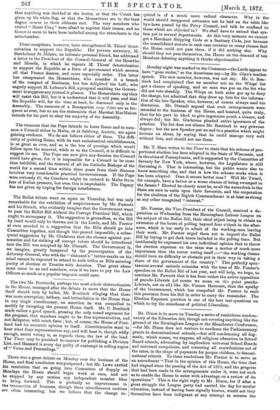Mr. Forster, the Vice-President of the Council, received a de-
putation on Wednesday from the Birmingham Labour League on the subject of the Ballot Bill, their chief object being to obtain an extension of the hours of polling beyond four o'clock in the after- noon, which is too early to admit of the working-men leaving their work. Mr. Forster urged them not to imperil the Ballot Bill by trying to get dark hours included in the polling time. But incidentally he expressed his own individual opinion that to throw the election expenses on the rates was a matter of much more importance than the secret voting itself ;—" the working classes should have no difficulty or obstacle put in tbeir way in taking a share of the government of the country." This perfectly spon- taneous avowal entirely coincides with the tone of Mr. Forster's speeches on the Ballot Bill of last year, and will help, we hope, to convince Mr. Fawcett that it has been rather the active opposition of pseudo-Liberals (of course we mean on this point pseudo- Liberals, not on all) like Mr. Vernon Harcourt, than the apathy of the Government, which has compelled Mr. Forster to omit this provision from his Bill in order to carry the remainder. The Election Expenses question is one of the best test-questions on which to try the soundness of political Liberalism.


































 Previous page
Previous page